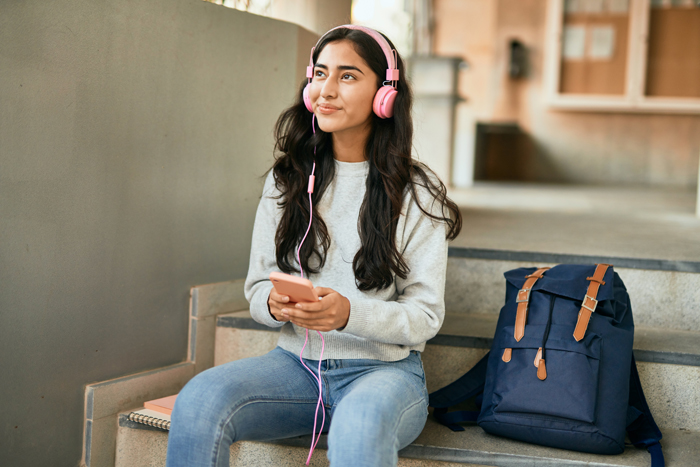Written by: Alexa Bailey, MSW, LCSW
Have you ever had those moments when you’re sitting at school in class or on campus and your heart starts to race? Your hands go clammy and your head gets fuzzy and you can feel a panic setting in? Experiencing panic and anxiety at school can be so stressful and often unexpected. It can hit at the worst times. Sometimes we can pinpoint exactly why we’re feeling it and sometimes we can’t. It can be helpful to try to understand where it’s coming from but even if we don’t know, there are definitely some things we can do to make sure that we stay okay.
Panic and anxiety are very physical. Our body is often reacting before our brain catches up to notice what is happening. Each of us have our own reactions to panic, but some common experiences might look like strong feelings of dread or danger, fear of losing control, feeling lightheaded or dizzy, tingling, chills, trembling or shaking, racing heart, feeling constriction in your chest, shortness of breath, tense muscles, dry mouth, and many other experiences. When we start to feel the symptoms set in, it usually means our body is going into a fight/flight/freeze/fawn reaction also known as a stress response or trauma response. Each of these responses is trying to do something different for us.
Fight: This reaction is when our body goes into fight mode, preparing us to overpower, whatever, threat or danger we are perceiving. It’s our way of confronting the threat in an effort to regain safety.
Flight: When our body believes we cannot overcome danger, we need to get away, this is where flight mode comes in. You may get a surge of adrenaline, and it kicks your body into gear. Even if you cannot physically leave a space, you might feel very fidgety or restless, and really want to move.
Freeze: Not always commonly noted, but the freeze response is what causes us to stay, stuck in place. When our brain can’t think and feel like we can’t fight or fight, we dip into freeze. It is that paralyzing feeling of being stuck.
Fawn: And finally, when fight, flight, and freeze don’t work, fawn is often where we end up. This is what can be called the “people pleasing” stress response. When experiencing this response during panic or anxiety, our way of getting safe is by making others happy or comfortable, ignoring our own needs, and being overly helpful.
It’s important to notice what form our panic and anxiety takes, to notice if we’re slipping into fight, flight, freeze, or fawn. When we know what our body is trying to do to get safe, we can intervene to make it safe by meeting the needs of fight/flight/freeze/fawn with grounding and soothing exercises.
Some simple steps to take is to check in with your body to notice what you’re experiencing and to start to connect coping skills to those symptoms. For instance, deep breathing can be helpful during anxiety, but when you’re in panic, it might be too difficult to access. So, you may need simpler physiological things to use instead like flexing your muscles and releasing them, putting your face in cold water, drinking cold water, walking outside, or things that allow you to become grounded.
Try to experiment different little things to see what works. Start out with a list of ideas. Notice what you’re already doing that feels good, even if it’s subconscious. If you notice that music has a big impact on you, you might want to make a playlist of music that allows you to feel calm and connected again. Or if you notice that using your hands brings you back into the moment, having access to Play-Doh or fidget toys might be a priority.
Finding what works for you is a valid exploration. It might look different than other people and that’s OK. Everyone needs something different. Especially at school, when we have limited access to certain things, we want to find simple ways to come back into our bodies, and to bring our stress levels back down. It’s okay if you get panicked or anxious, we all will at some point, it’s about what we do during and after we feel anxiety. We want to make sure we take care of ourselves.
**************************************************************************************************************
Alexa Bailey is a Licensed Clinical Social Worker (LCSW), who works in private practice providing therapeutic services at Evolve Counseling. She has experience treating several different populations and areas, including trauma, anxiety, depression, relational challenges, and life transitions with both young adults/adolescents and adults. Alexa is a big advocate of self-care and creating whole personal wellness through positive change and healthy habits.

